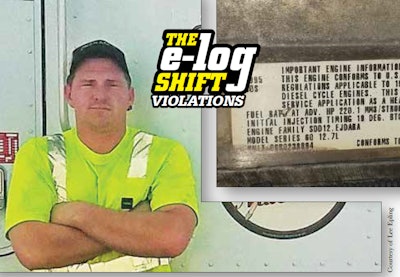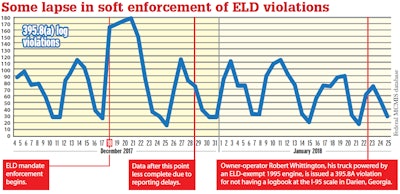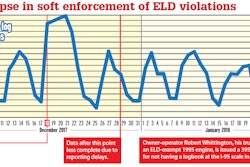
Come April 1, the Commercial Vehicle Safety Alliance’s out-of-service criteria related to the electronic logging device mandate go into effect. Inspectors will be able to put an operator out of service for not having an ELD if he or she is required to adhere to the mandate.
However, enforcement in the pre-April 1 transition period hasn’t been as simple or as uniform as it might sound.
Starting April 1, the regulatory code associated with a violation written to a carrier not running an ELD when required will be 49 Code of Federal Regulations 395.8(a). It’s the same violation that’s commonly issued when an inspection reveals a driver not keeping a log book when required.
In the month preceding the mandate’s Dec. 18 enforcement inception, the Federal Motor Carrier Safety Administration asked states to code such a violation under a different section, 49 CFR 395.22(a), says Capt. Chris Turner of the Kansas Highway Patrol, CVSA’s current president. That regulation specifies that drivers subject to the mandate must use a device on FMCSA’s ELD registry of devices.
The reason the agency asked for this procedure was so that it could reliably exclude ELD mandate violations from carriers’ Safety Measurement System scores in the Compliance, Safety, Accountability system. The rationale was that the softer approach was justified given the burgeoning market for ELDs and challenges and exemptions to the mandate having run well into last year. Also, there was a lag in officer and driver training on how to use and/or examine the devices.
The three-and-a-half month transition period, industry watchers felt, might give regulators and those regulated extra time to get adjusted before out-of-service enforcement kicked into gear. Excluding the serious 395.8(a) violations wasn’t feasible, as that would give drivers running without any form of logs a pass entirely in CSA SMS tracking.
There’s evidence, however, that not all inspectors and states have granted FMCSA’s request related to violation coding. Violations of 395.8(a) jumped significantly during week 1 of the mandate and were on average elevated during the brief period following Dec. 18, for which near-complete reporting existed at press time, even with the holiday period’s decreased trucking and enforcement activity in play.
 Follow this link for more explication of the data presented. Violations of 395.8(a) written prior to April 1 for not having an ELD in place like as not can be successfully challenged via FMCSA’s DataQs process and removed from carrier records.
Follow this link for more explication of the data presented. Violations of 395.8(a) written prior to April 1 for not having an ELD in place like as not can be successfully challenged via FMCSA’s DataQs process and removed from carrier records.Asked if there’s any discussion within CVSA or from the federal government of an extension of the current “soft enforcement” period, CSVA Executive Director Collin Mooney says, “None whatsoever. We feel we’ve aided in the implementation process, and that’s it. We’re disappointed with some segments of the industry that have taken the view that April 1 is the new implementation date” and not what it is — the beginning of a stiff approach to mandate enforcement. “April 1 was very reasonable. Time to comply.”
As late as Jan. 22 in the period shown on the chart at this link (and above), Georgia-based owner-operator Robert Whittington, leased to York, South Carolina-based Epling Transportation, ran into a problem. He was dinged for not having an ELD during a Level 3 credentials inspection at an Interstate 95 scale in Darien, Georgia. While Whittington’s paper logs were in order and he was not placed out of service, the violation shown on the inspection report was 395.8(a), not the more lenient 395.22(a) as requested by FMCSA.
The most outrageous part was that Whittington’s 2001 Freightliner Century was powered by an ELD-exempt 1995-built Detroit Series 60 engine.
The week after the incident, Lee Epling, owner of the three-truck all-owner-operator fleet, was hauling flatbed freight and “stopped at the Ringgold [Georgia] scale on I-75 coming out of Tennessee.” Epling asked the scalemaster about training for Georgia troopers on how to determine whether a truck was ELD-exempt or not, based on the engine year.
“They had a four-day conference in Georgia” prior to the mandate going into effect, Epling says he was told. The officer “even went out to his car and pulled the manuals out and handed them to me. Now, unlike the regs in the little green book [the Federal Motor Carrier Safety Regulations], those manuals were written in plain English.”
They told him the trooper who’d issued the ELD violation to owner-operator Whittington should have allowed him to “pop the hood on the truck” to get a look at the engine plate, where he clearly would have seen stamped a 1995 manufacture date.
“Even if he couldn’t make the determination on-site during the inspection,” the manual clearly spelled out that the determination would need to be made by contacting company ownership for documentation, all of which squares with procedures FMCSA and state representatives laid out for Overdrive in the months before Dec. 18.
“This guy did none of that,” Epling says.
The 395.8(a) violation and its 5-point non-OOS severity weight at press time was contributing to Epling Transportation’s Hours of Service Compliance BASIC measure in the CSA SMS. The measure shot up from 0 for the last two years, with five driver inspections, to 1.25 with this sixth. For a three-truck fleet, that translates to a 48.9% score in the BASIC with just a single violation. That’s below the intervention threshold, but Epling could risk a focused audit should any of his three units incur another hours violation.
As have so many others, Epling worries these ticky-tack compliance issues could put his freight contracts, including an important one with a 3PL handling a fiberoptic cable manufacturer’s account, in jeopardy and drive his leased owner-operators from the business entirely. “I’d rather continue to fight these guys and take hits than lose my driver,” Epling says.
And indeed, owner-operator Whittington says he’s thought about finishing out his near three-decade safe driving career by instead working on trucks, given this and other inspections. That includes one at the same set of scales in Georgia that dinged him for brakes being out of adjustment due to a single malfunctioning auto-slack adjuster.
Before being issued the ELD violation, Whittington’s inspector “wouldn’t even open my hood after I told him I had an older engine,” he says, its year and serial number clearly readable on the plate. “Whether it’s laziness or he just didn’t want to do it — or maybe it’s just that one guy. He told me, ‘You can just DataQ it,’ ” referring to FMCSA’s DataQs system for challenging erroneously issued violations.
Georgia Captain Jeremy Vickery at headquarters says the violation is in error and most of his state’s inspectors are coding ELD violations in line with FMCSA’s request for soft enforcement with 395.22(a).
Epling has put that DataQ challenge in to try to clear the violation. At press time, the challenge was still in process but Georgia had agreed to remove the violation.
The DataQ response is also what CVSA’s Mooney, Turner in Kansas and others have recommended for 395.8(a) violations of the ELD mandate issued prior to April 1.
With such issues in play, some have begun to call for further delay. Travis Baskin, head of regulatory affairs for the KeepTruckin ELD provider, believes an extra two months could be a reasonable answer. “Everybody ought to get until June 1” before stiffer enforcement begins, he says. “FMCSA needs to give every single driver time until some continuity in enforcement can be found.”
Such a delay was proffered in Baskin’s comment to the regulatory docket for the Owner-Operator Independent Drivers Association’s request for an exemption to the mandate for proven safe carriers with less than $27.5 million in gross annual receipts. Baskin does not agree such an exemption should be granted, putting him at odds with many of the more than 4,000 commenters on the exemption — as well as plenty, though not all, Overdrive readers.
Comments on the exemption request closed Feb. 1. At press time, FMCSA had not yet responded to the request.
Next in this series: Use DataQs to contest 395.8(a) violations written for not having an ELD prior to April 1









